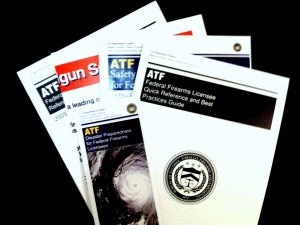Failure to Conduct a Background Check When Required.
According to ATF published statistics, FFLs cited for failure to conduct a NICS background check when required ranks 9th among the top ten violations cited. As evidenced by the statistic, failure by FFLs to conduct a background check as required is a relatively rare occurrence.
However, there are a number of scenarios that can cause FFLs to fail to conduct a background check.
Inexperienced licensees and large businesses with frequent employee turn-around may be more susceptible to exposure in this area.
As we know, the vast majority of FFLs are honest and do their absolute best to comply with all regulations; especially NICS requirements.
The vast majority of violations cited by ATF are not willful violations of the Gun Control Act; they’re human error.
Furthermore, businesses of all types may at one time or another hire a person who is either incompetent, or dishonest.
FFLs are ultimately responsible for what occurs under the Federal Firearms License, but violations of this type are generally cited as the result of the errors, omissions and rare intentional acts of staff members.
A failure to conduct a background check can also be the result of misreading or misinterpretation of regulations.
FFLs operating in states that allow for concealed carry permit holders to be exempted from NICS background checks should be especially mindful and ensure they follow the requirements of state and federal law.
As professionals who want to stay in business, we should do everything possible to ensure we perfect our internal controls, quality control, employee screening and monitoring, and our knowledge of federal, state and local requirements. Doing so helps us reduce the probability of being cited for violations during an ATF inspection.
ATF Compliance Tactics
With respect to conducting background checks, FFLs can incorporate some simple but effective tactics to reduce the possibility of failures. Over the years, I’ve found that attitudes vary among licensees regarding compliance.
Some FFLs take a more proactive and engaged role with the process and with employee training etc. Some FFLs seek out knowledge about the law and regulations while others are more reactive and wait for things to go wrong before addressing them.
It’s beneficial to the FFL to always take a proactive role with compliance issues. Small changes in policy can have a major impact on compliance.
Always Assume A Background Check Is Required
It’s not a good idea to “assume” anything right? Not always. In the case of disposing firearms to non-licensees, it’s a good policy for FFLs to instill within their staff, that all firearms dispositions to non-licensees require a background check.
This will set the tone for employees to be aware that no firearms leave the premises until a “proceed” determination is received, or other evidence exists fulfilling the requirements of 27 CFR 478.102.
Have A Manager Or Other Responsible Person Approve The Disposition
FFLs could also require all transactions that appear to not require a NICS background check to be approved by the FFL, store manager or other Responsible Person. This tactic will ensure that two persons are in accordance with the firearm transfer scenario.
A common scenario in which this violation occurs is the expiration of the NICS 30 day limitation on a single transaction.
At times a customer will put some money “down” on a firearm and return the following month to finalize the transaction. If the NICS check was conducted over 30 days from the date of disposition, the NICS check will have to be repeated.
FFLs may rely on a NICS check conducted for one transaction, and when the customer returns a few days later for another firearm, the same NICS number is used. NICS approvals or only good for one transaction.
As stated above, these are usually mistakes due to inexperience, but experienced FFLs with new or untrained staff are vulnerable to this scenario.
ATF 4473 Documents Examination
The FFL should also periodically conduct random sampling of ATF Forms 4473 on file. I recommend conducting this self-audit at least quarterly, but absolutely every 6 months. This tactic helps identify problems early and allows for corrections to be made promptly. The examination should target specific forms, periods of time or situations the FFL believes increase the probability of errors on the ATF F 4473.
No matter how small or large a retail firearms store is, the FFL should implement a system in which required documents are screened by a second person prior to permanent filing.
Exceptions to the NICS background check.
As we know, there are exceptions for concealed carry permit holders in some states. FFLs in these states should be mindful of state and federal regulations. Consult the ATF website to find out if your state is one of these states, and ensure the law has not changed.
Although states and ATF try to communicate changes to state and federal law as efficiently as possible, there are circumstances in which the FFL may not be advised of such changes.
It’s incumbent upon the licensee to stay informed on these issues.

